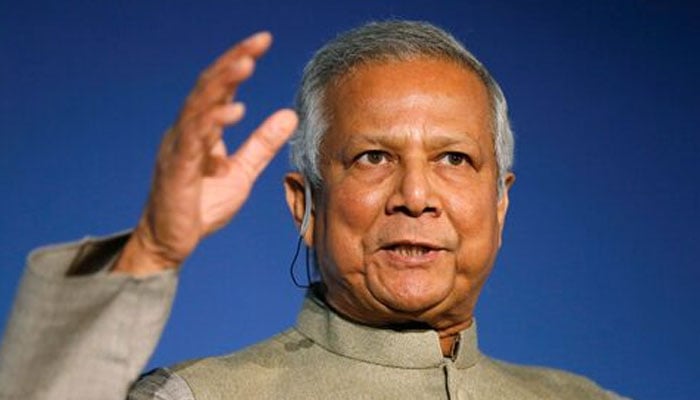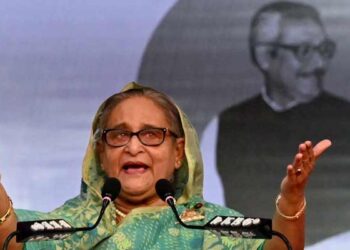Select Language:
- Yunus must stay in power for a smooth transition, says Faiz.
- The resignation threat followed protests by the BNP against the interim government.
- Minister Faiz warns military against interference in politics.
Muhammad Yunus, the Chief Adviser of Bangladesh, “must remain” in his interim role to facilitate a peaceful transfer of power, stated a cabinet official and advisor on Friday.
The 84-year-old Nobel Peace Prize laureate, who assumed office after a major uprising last year, indicated he would resign if he did not receive support from political parties, according to sources close to him and his allies.
Since the student-led protests that ousted former Prime Minister Sheikh Hasina in August 2024, the country has experienced significant political unrest, with numerous groups demonstrating in the streets over various issues.
“For the sake of Bangladesh and to ensure a smooth democratic transition, Professor Yunus needs to hold his position,” stated Faiz Ahmad Taiyeb, a special assistant to Yunus and head of the Ministry of Posts, Telecommunications, and Information Technology, in a Facebook post.
“The Chief Adviser is not contemplating stepping down,” he added, emphasizing that Yunus does not seek power. He later deleted this post.
The political situation in Bangladesh intensified this week, with clashing parties taking to the streets in the capital, Dhaka, each presenting their own demands.
Yunus’s reported threat to resign surfaced after thousands of supporters from the influential Bangladesh Nationalist Party (BNP) gathered in Dhaka, taking to the streets against the interim government for the first time.
Yunus has committed to holding elections by June 2026 at the latest in the predominantly Muslim nation with a population of around 170 million people.
However, BNP supporters—considered strong contenders in the upcoming elections and the first since Hasina’s ouster—have insisted that he set a specific election date.
‘Chaotic Phase’
Reportedly, Yunus’s relationship with the military has strained as well.
Local media and military sources have indicated that army chief General Waker-Uz-Zaman stated on Wednesday that elections should occur by December, warning that Bangladesh is currently experiencing a “chaotic phase” and conditions are deteriorating.
Taiyeb issued a warning to the military on Friday, asserting, “The army shouldn’t engage in politics.” He added, “In any civilized nation, the military doesn’t intervene in political matters,” criticizing the military chief’s remarks.
‘Excessive Restrictions’
The military played a pivotal role in ending Hasina’s administration by refraining from suppressing the uprising, which resulted in over 1,400 protester deaths due to police violence.
It was Waker-Uz-Zaman who announced Hasina’s ouster, leading to a brief military takeover before power was handed over to Yunus.
On Thursday, the army released a statement aimed at countering divisions between the military and the public, claiming, “Certain interested parties are spreading misinformation to incite discord between the army and the general populace.” The statement detailed the hundreds of individuals sheltered in military bases during the upheaval to protect them from extrajudicial killings.
Among those the army claimed to have sheltered were 24 political figures, numerous judges, civil servants, academics, and over 525 police officers.
No specifics were provided on those accused of attempting to undermine the military’s support.
The National Citizen Party (NCP), formed largely by the students at the forefront of the uprising against Hasina and affiliated with Yunus, has previously accused the military of backing Hasina’s Awami League party.
Sheikh Hasina, now 77, remains in self-imposed exile in India, defying an arrest warrant tied to allegations of crimes against humanity related to the police crackdown.
This month, the government banned the Awami League following protests outside Yunus’s residence, a move criticized by Human Rights Watch as “an excessive restriction on fundamental freedoms similar to the previous government’s oppressive measures.”







